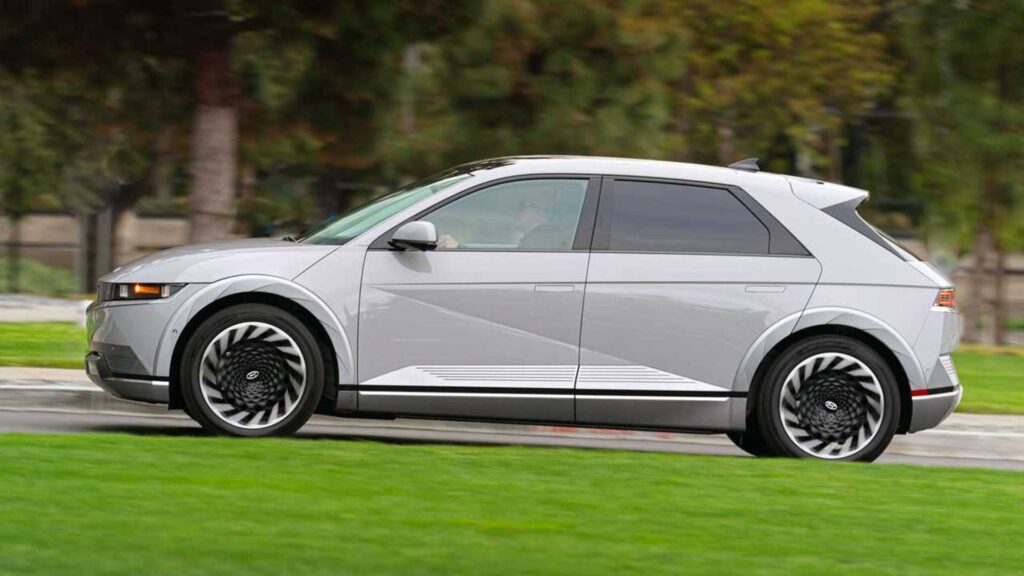Following our Q4 and 2023 all-electric car sales report for non-Tesla brands in the U.S., it’s time to take a look at the automotive group level.
This will reveal which companies are selling the highest number of battery electric vehicles (BEVs) and which are achieving the highest share of BEVs out of their total sales volume.
Get Fully Charged
Traditional OEMs are scaling up their EV sales
In 2023, sales of all-electric cars by traditional carmakers almost doubled compared to 2022. The Hyundai Motor Group, Ford and General Motors were among the top non-Tesla OEMs in terms of BEV sales last year.
This report includes 11 manufacturers for which consistent data is available: BMW Group (BMW and Mini, but without data for the Mini Cooper SE model), Ford Group (Ford and Lincoln), General Motors (the BrightDrop delivery van division, Cadillac, Chevrolet, GMC), Hyundai Motor Group (Hyundai, but without data for the Hyundai Kona Electric model, Kia and Genesis), Mazda, Mercedes-Benz (excluding its van division), Nissan, Subaru, Toyota Group (Toyota and Lexus), Volkswagen Group (Volkswagen, Audi and Porsche) and Volvo.
Not all manufacturers report their sales results in the U.S., especially the newer companies like Tesla, Rivian, Polestar and Lucid. They do not break out sales by country or region so their figures can’t be included in this report.
BEV Sales By OEMs – Q4 2023
The listed 11 traditional automakers delivered a record of more than 134,000 all-electric cars in Q4 2023 (up about 60% year-over-year).
Last quarter, Ford was especially strong with a record of 25,937 BEV sales. It seems that Ford was able to outpace the Hyundai Motor Group in Q4 (23,609), although we are not certain because we don’t have sales data for the Hyundai Kona Electric model.
Volkswagen Group was able to sell 20,403 all-electric cars in the U.S. during the last quarter, which is more than General Motors (19,469, including 12,551 Chevrolet Bolt EVs/Bolt EUVs).
Then we can see two European luxury OEMs—BMW Group (at least 14,374) and Mercedes-Benz (13,511). The Toyota Group happened to be the best of the rest with 5,718 units sold in Q4.
* Excludes Tesla and other OEMs for which data was not available
** Hyundai sales without the Hyundai Kona Electric model
*** BMW Group sales without the Mini Cooper SE
In Q4, the highest BEV share was achieved by the Mercedes-Benz brand (excluding vans) at 18.7%, followed by the BMW Group (at least 12.1%) and Volkswagen Group (11.6%).
Let’s note that at least for now, this metric is a bit skewed. Not all brands within particular groups are even offering BEVs, which lowers the average of the large groups compared to single-brand automakers.
Here is a tree map version of the chart:
* Excludes Tesla and other OEMs for which data was not available
** Hyundai sales without the Hyundai Kona Electric model
*** BMW Group sales without the Mini Cooper SE
**** Mercedes-Benz (excluding vans)
BEV Sales By OEMs – Q1-Q4 2023
With no less than 450,000 all-electric sold by the listed 11 traditional automakers (up 83% year-over-year), the ones with the highest results are Hyundai Motor Group, General Motors and Ford.
In 2023, the Hyundai Motor Group sold in the U.S. 85,474 all-electric cars (plus an unknown number of Hyundai Kona Electric). That’s a big, 60% increase year-over-year.
General Motors, due to many challenges related to the ramp-up of the Ultium platform EVs and UAW strikes, should be satisfied with the second position among non-Tesla OEMs. GM delivered 75,883 BEVs last year—slightly more than Ford, which closed the year with 72,608 BEVs.
Once again, a big surprise is the Volkswagen Group with 70,398 units sold. BMW Group (45,417) and Mercedes-Benz (43,202) are also pushing BEVs relatively hard, achieving a much higher market share in the BEV segment than their market share in the overall market.
Nissan with 20,616 BEV sales in 2023 was the best of the rest, but without any significant changes, it might soon find itself behind Toyota Group.
Let’s all remember that Tesla likely sold over 600,000 all-electric cars last year in the U.S. The total BEV volume in 2023 is estimated at more than 1.1 million units. We believe that Rivian (not listed here) might be between 40,000 and 50,000, depending on how many of its 50,122 deliveries happened in the U.S.
* Excludes Tesla and other OEMs for which data was not available
** Hyundai sales without the Hyundai Kona Electric model
*** BMW Group sales without the Mini Cooper SE
Let’s now move to the share of BEVs out of the OEM’s total sales. According to sales data analyzed by InsideEVs, in 2023, only four traditional OEMs exceeded 10% BEV share.
The top manufacturers are Mercedes-Benz (15.3%), BMW Group (at least 11.5%), Volkswagen Group (11.1%) and Volvo (10.6%). The Hyundai Motor Group achieved at least 5.2%. Ford, with 3.6% also appears to be slightly above the industry average.
For reference, the U.S. BEV average share in 2023 is estimated at about 7.5%. However, this includes all manufacturers, like those selling only electric cars (Tesla). Because Tesla alone sold more than half of the BEVs in the U.S. last year, the real average BEV share for traditional OEMs is probably closer to 3%.
Here is a tree map version of the chart:
* Excludes Tesla and other OEMs for which data was not available
** Hyundai sales without the Hyundai Kona Electric model
*** BMW Group sales without the Mini Cooper SE
**** Mercedes-Benz (excluding vans)







